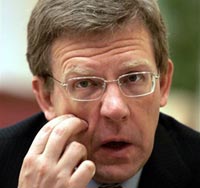Opening forum, official says Russia to enter top 5 world economies by 2020
A top official seen as a potential Kremlin favorite to succeed President Vladimir Putin next year pledged Saturday that Russia would transform itself into a high-technology and industrial powerhouse and enter the top five world economies by 2020.

In his opening address at an economic forum in St. Petersburg, First Deputy Prime Minister Sergei Ivanov said Russia was taking steps to diversify an economy heavily dependent on oil and gas exports and further open it to investment. He spoke amid chilly relations with the West and concerns over the fate of a gas development controlled by Britain's BP PLC.
"Our human capital is the foundation for diversifying our economy," Ivanov told an audience of government officials and CEOs gathered for the 11th St. Petersburg Economic Forum.
The forum is one of the final high-profile opportunities for Putin to boast of Russia's oil-driven economic growth during his presidency and to dispel fears the nation is becoming an increasingly risky investment because of its growing political estrangement from Europe and the United States.
It brings together a number of corporate heavyweights, testimony to the investment potential of Russia's booming economy despite Moscow's increasingly strained diplomatic and political ties with the West. Some US$3.3 billion (euro2.5 billion) worth of deals are expected to be signed, including a US$135 million (euro100 million) agreement with Japan's Suzuki Motor Corp. to build a car plant outside the city.
In the past few weeks alone, Moscow has raised the specter of a new arms race in response to U.S. plans for a missile shield in Europe, rejected Britain's demand to extradite the suspect in the radiation poisoning of former Soviet agent Alexander Litvinenko, and increased the pressure on a BP venture developing a giant gas field.
Russia's benchmark RTS stock index is up just 2 percent in the past three months, the worst performer among emerging markets. That compares to a 70 percent rise in 2006, when it turned in the best performance after China.
Ivanov sought to allay fears that Russia was taking a more authoritarian path under Putin, who has been criticized for muzzling media and backtracking on democracy.
"What will Russia be like in 2020? It will be democratic, based on the rule of law, and it will respect the rights of individual," Ivanov said.
Ivanov also predicted it would control at least 10 percent of world production in nuclear energy, aviation, space industry, shipbuilding, software and nanotechnology. While Russia is creating state holding companies to oversee these sectors, they would work in close cooperation with foreign corporations, he said.
The former defense minister is now in charge of industry and technology, a portfolio he is using to grab the spotlight before March 2008 presidential elections in which he is seen as a front-runner for the support of the popular Putin, who is constitutionally barred from a third straight term.
Amid rivalries in Putin's Cabinet and consolidation of state control over industries, Finance Minister Alexei Kudrin warned against expanding state subsidies.
"State support for various (industrial) sectors isn't consistent with their success, especially in areas of modern technology," Kudrin said. He said the level of state subsidies in the national economy was still higher proportionately than in the U.S. or other developed economies, even after over a decade of economic reform.
Former World Bank chief James Wolfenson welcomed Ivanov's pledges of an open business climate.
"Hearing your speech is a signal that Russia is open for business," he said, despite a lingering "uncertainness" about Russia due to "prejudices of the past."
"To many of us, the Kremlin still looks like an unapproachable place, but the strides you are making in terms of opening up have been tremendous," he said.
The scale of the forum in Putin's hometown reflects a desire to make an impression. Organizers have raised the forum's budget nearly 70 percent to 500 million rubles (US$19 million; Ђ14 million) this year. Some 6,000 participants were expected, and an exhibition center on the Gulf of Finland has been expanded for the occasion.
Among those slated to attend were Jeroen van der Veer, CEO of Royal Dutch Shell PLC; Coca-Cola Co. COO Muhtar Kent; BP CEO Tony Hayward; ArcelorMittal CEO Lakshmi Mittal; Siemens AG CEO Klaus Kleinfeld; and PepsiCo Inc.'s Vice Chairman Michael White.
China said it would send 168 executives, the largest delegation.
Subscribe to Pravda.Ru Telegram channel, Facebook, RSS!


